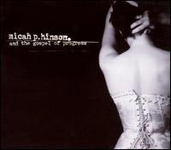|
|
 |
Dusted Reviews
Artist: Micah P. Hinson Album: And the Gospel of Progress Label: Overcoat Review date: Jun. 26, 2005 |

|
|
|
 |
Micah Hinson is a liar, a thief, an ex-con from Texas who has personally learned the value of false hope. In compiling his laundry list of tribulations, the 23-year-old flukie knows that the truth always hurts less when gowned in good intentions. His earnest insistence that there are “no worries now” in the heartbreaking refrain of "Close Your Eyes" would seem the emptiest of promises, if not for the compassion underneath. Indeed, worries abound on the 13 songs comprising his debut record, all accompanied by a heartache resembling Richard Buckner or Sam Cooke more than his fellow jailbird, Mr. Cash.
Again with the lies, Hinson intones on "Don’t You Forget" that "there I things that I do / that don’t mean a thing anyway," setting up the letdown with a precision that belies the inevitable. Born of a studio collaboration with The Earlies (credited here as the Gospel of Progress), the record is a meticulously-arranged, elaborate, naked "thank you" to the people in Hinson’s life who have elevated him from his prescription-forging past as a bum.
And Hinson relents rarely, if it all, along the way, channeling the exhilaration of exhaustion. The gospel dirge of "At Last, Our Promises" employs layers of rusty strings that serve less to shield his insistence that “it’s all my fault” than they do to amplify the sentiment. By similar turn, the appropriately-titled "Stand in My Way" employs playful horns not to accentuate, but contrast the complaint that "it’s not what you said, but just how you said it to me."
Sometime around the 40th minute, during the refrain of "Caught in-Between" – an attempt at self-affirmation that seems doomed from the outset – this Midwestern heartache starts to reveal precedent. Shades of Springsteen’s Nebraska and an oft-referenced Jeff Mangum are both reflected in the laments of the Gospel of Progress – albeit less-narrative than the former and less-contrived than the latter. The veil of sincerity – regardless of its authenticity – lends just enough verisimilitude to Hinson’s anguish. In a world that so often sees what it wants to and ignores the rest, Hinson makes a valiant case against the sanctity of truth.
By Ian Fitzpatrick
|







